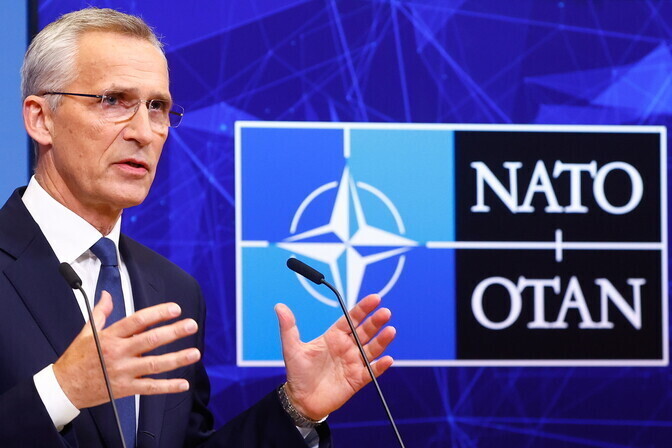hankyoreh
Links to other country sites 다른 나라 사이트 링크
[Column] Safari in Sarajevo, in Ukraine, and in the world


I don’t like to write about cultural products from my own country, but I simply have to make an exception for “Sarajevo Safari” by Miran Zupanič (2022), a documentary about the arguably most bizarre and pathological event that took place during the siege of Sarajevo from 1992 to 1996.
It is well known that snipers on the hills surrounding Sarajevo occupied by Serb forces were arbitrarily shooting residents on the streets below them. It was also well known that selected Serb allies, mostly Russians, were invited to shoot a couple of shots on Sarajevo, but this was considered an honor, a sign of special appreciation, not a business.
But “Sarajevo Safari” shows us the real business that went down. Dozens of rich foreigners — mostly from the US, UK and Italy, although some also from Russia — paid high fees for the chance to shoot at the residents of the besieged Sarajevo. The trip was organized by the Bosnian Serb Army; the customers were transported from Belgrade to Pale and then brought to a safe place with a vantage point of Sarajevo down in the valley.
We learn from the documentary that not only the top command of the Bosnian Serb Army but also NATO peacekeeping forces in Bosnia were aware of this “safari.”
But what is of special interest here is the form of subjectivity of the safari “hunter”: victims were not personalized, they remained anonymous, and a symbolic wall separated the hunter from the target. It was nonetheless not a video game, victims were part of reality, and the awareness of this fact accounts for the perverse thrill of such “hunting.”
To be more precise, it is not the victim who was de-realized in this scenario, it was the “hunter” himself who excluded himself from ordinary reality and perceived himself as located in some safe place above reality. This is how reality itself became part of a spectacle in which the hunter could pretend that he was not personally involved.
Did Dmitry Medvedev, a former Russian president who now serves as deputy chairman of Russia’s Security Council, not rely on a similar logic when he recently said that the US-led NATO military alliance would be “too scared of a nuclear apocalypse” to directly enter the conflict in Ukraine in response to Russia using tactical nuclear weapons?
“I believe that NATO will not directly intervene in the conflict even in this situation,” Medvedev said. “After all, the security of Washington, London, Brussels is much more important for the North Atlantic Alliance than the fate of a dying Ukraine that no one needs. [. . .] The supply of modern weapons is just a business for Western countries. Overseas and European demagogues are not going to perish in a nuclear apocalypse. Therefore, they will swallow the use of any weapon in the current conflict.”
Where does Medvedev speak from when he talks like that? What is his subjective position? He does not include himself among those who will perish, as if he will somehow survive the global nuclear catastrophe — as if humanity is like Sarajevo in the valley and he is at a safe distance on a hill above it.
It is clear to everybody that Medvedev’s words have to be read against the background of Russia’s formal annexation of the Russian-occupied parts of Ukraine: In this way, any Ukrainian intrusion into those parts could be declared a threat to the survival of Russia as a state, and thus justify the use of tactical nuclear weapons.
He also said Russia will “do everything” to prevent nuclear weapons from appearing in Ukraine — but since it is Russia that threatens the very existence of another state (Ukraine), does this other state not also have the right to defend its existence by tactical nuclear weapons? We should thus take seriously the idea that it is Ukraine that should be given nuclear weapons to establish a basic parity with Russia. Recall Putin’s words: “There is no in-between, no intermediate state: either a country is sovereign, or it is a colony, no matter what the colonies are called.”
Our strategy should be precisely not to treat Ukraine as anyone’s colony. This is also why we should resolutely reject the argument that the powerful Western states should intervene directly, bypassing Ukraine. Harlan Ullman and others have argued, “Is Ukraine too important to be left to Zelenskyy? The United States needs a strategy with an off-ramp to seek an end to the violence and the war.”
Is this not precisely what Russia wants? I have no doubt that some Leftist peaceniks will reject my suggestion with horror, interpreting Medvedev’s statements as a warning to Ukraine and the West to show restraint, arguing we shouldn’t push Russia too much into a corner. This, however, is precisely the stance we should avoid at any price. The peaceniks who are against NATO and sending arms to Ukraine ignore the key fact that it was Western help that allowed Ukraine to resist — without it, Ukraine would be all long occupied. This help led to today’s stalemate which created the conditions for a possible peace compromise.
We hear again and again that Russia should be allowed to save face, but statements like Medvedev’s make it impossible for Ukraine and the West to save their faces, declaring in advance a compromise as proof of Western cowardice.
One of the arguments against Ullman is the true enigma of Medvedev’s words: Why is he publicly saying what he is saying? Why does he add insult to injury and in advance interpret the Western refusal to respond with a nuclear counterattack as a sign of timidity?
Here we unexpectedly enter the domain of philosophy: Putin’s and Medvedev’s words clearly echo the most famous passage in Hegel’s “Phenomenology”: the dialectic of master and servant. If, in the confrontation of the two self-consciousnesses engaged in the struggle of life and death, every side is ready to go to the end in risking its life, then there is no winner — one dies, the other survives but without another to recognize it.
The whole history of freedom and recognition — in short, the whole of history and human culture — can take place only with an original compromise: In the eye-to-eye confrontation, one side (the future servant) “averts its eyes.” Medvedev presumes that the decadent, hedonist West will avert its eyes.
However, what complicates the situation is that, as we know from the Cold War, in a nuclear confrontation there is no winner: both sides disappear.
But the true madness resides in the fact that we are talking about the threat of nuclear annihilation while we are all committing collective suicide by way of ignoring environmental changes — as if the self-annihilation toward which we already are slowly drifting can be made less terrifying if we focus on the potential future of nuclear war. This threat of nuclear destruction makes us — not all of us but those who can push the buttons — a version of homo deus, but in a negative sense: The only divine act we are now able to commit is the one of self-destruction — something that, as we learned recently, a stupid virus is also able to do.
Please direct questions or comments to [english@hani.co.kr]

Editorial・opinion
![[Column] Life on our Trisolaris [Column] Life on our Trisolaris](https://flexible.img.hani.co.kr/flexible/normal/500/300/imgdb/original/2024/0505/4817148682278544.jpg) [Column] Life on our Trisolaris
[Column] Life on our Trisolaris![[Editorial] Penalties for airing allegations against Korea’s first lady endanger free press [Editorial] Penalties for airing allegations against Korea’s first lady endanger free press](https://flexible.img.hani.co.kr/flexible/normal/500/300/imgdb/original/2024/0502/1817146398095106.jpg) [Editorial] Penalties for airing allegations against Korea’s first lady endanger free press
[Editorial] Penalties for airing allegations against Korea’s first lady endanger free press- [Editorial] Yoon must halt procurement of SM-3 interceptor missiles
- [Guest essay] Maybe Korea’s rapid population decline is an opportunity, not a crisis
- [Column] Can Yoon steer diplomacy with Russia, China back on track?
- [Column] Season 2 of special prosecutor probe may be coming to Korea soon
- [Column] Park Geun-hye déjà vu in Yoon Suk-yeol
- [Editorial] New weight of N. Korea’s nuclear threats makes dialogue all the more urgent
- [Guest essay] The real reason Korea’s new right wants to dub Rhee a founding father
- [Column] ‘Choson’: Is it time we start referring to N. Korea in its own terms?
Most viewed articles
- 160% of young Koreans see no need to have kids after marriage
- 2New sex-ed guidelines forbid teaching about homosexuality
- 3[Column] Life on our Trisolaris
- 4OECD upgrades Korea’s growth forecast from 2.2% to 2.6%
- 5Hybe-Ador dispute shines light on pervasive issues behind K-pop’s tidy facade
- 6Months and months of overdue wages are pushing migrant workers in Korea into debt
- 7S. Korea discusses participation in defense development with AUKUS alliance
- 8Presidential office warns of veto in response to opposition passing special counsel probe act
- 9[Reporter’s notebook] In Min’s world, she’s the artist — and NewJeans is her art
- 10[Editorial] Penalties for airing allegations against Korea’s first lady endanger free press